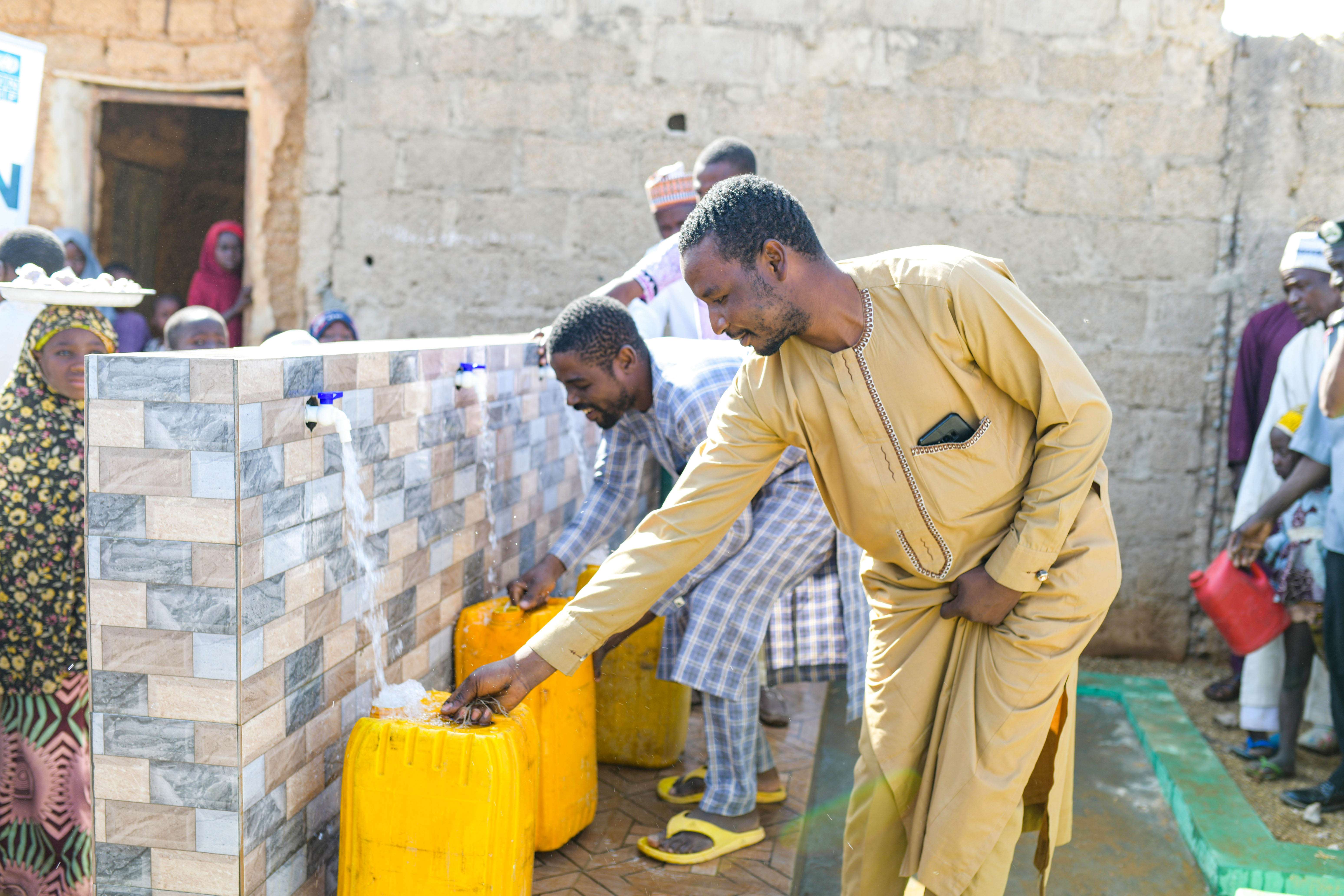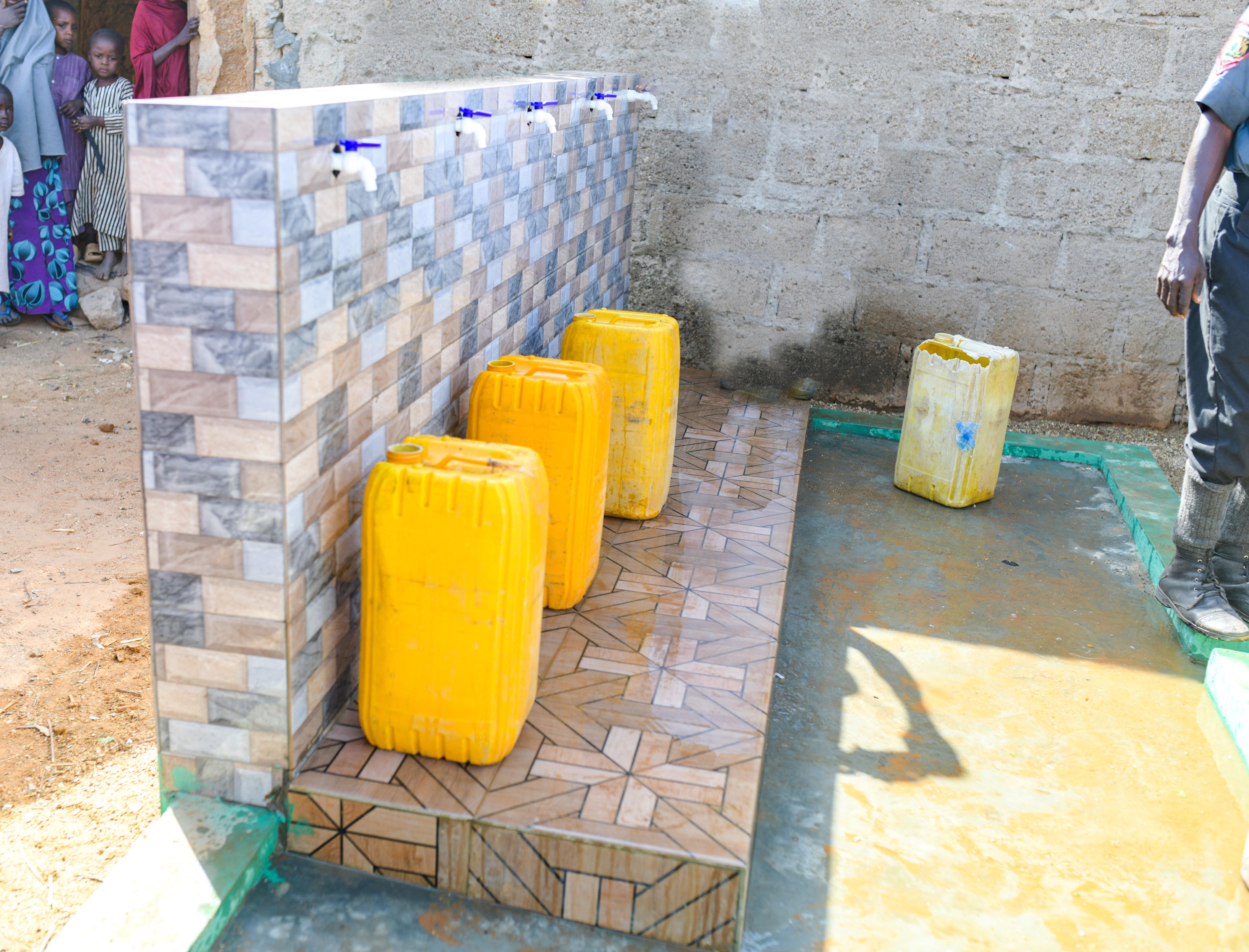Community members in Doka Community fetch water from one of the outlets.
Until recently, accessing clean, safe and reliable water in Doka and Tofa Communities in Kano State was unstable and difficult, an issue that has exacerbated the threats of COVID-19 and has led to water-related diseases and mortalities.
Although most community members are farmers and rear livestock in the outskirts of the city, water is scarce. Majority of the water supply in Tofa and Doka came from nearby communities and water vendors, and occasionally from the community leaders when available. This often resulted in conflict between communities who also depend heavily on water for their livelihoods. To address this growing challenge, the Women Farmers Advancement Network (WOFAN), with support from the United Nations Development Programme (UNDP), assisted by drilling 2 water solar boreholes with 500,000 litres capacity for both communities.
Solar powered borehole in Doka Community
Solar powered borehole in Tofa Community
One of the water outlets in Tofa Community
UNDP is working with WOFAN through the Small Grants Project (SGP) to help both communities adapt to climate change, improve their water management and promote sustainable livelihoods. The two communities are the biggest towns in Tofa Local Government Area in Kano State, contributing about 70% of the estimated population of 116,292 in that local government (NBS, 2021).
Boreholes are used to provide safe and clean water from underground and has provided long-term access to hundreds of households within these two communities. The boreholes are solar powered and have a total of 20 outlets each, with 10 outlets for domestic water collection, and another 10 for a mosque to carry out religious obligations. They also assist with irrigation purposes for nearby farms and vegetable gardens, which has also led to reduced dependence on streams and stagnant waters.
These communities have already seen major benefits. For example, with a much shorter walk for water, community members have more time for school, work, and other activities:
Community members in Tofa community fetch water from one of the outlets.
“The construction of these boreholes will positively impact years of education by freeing up time that children spend collecting water instead of going to school. It will also reduce the prevalence of disease that can keep them out of school and will contribute to a safe and healthy learning environment”, community leader Garba Wakili said. He also added that it has also reduced the burden of water collection by women and girls over long distances, which has been associated with negative effects on well-being, and a higher risk of gender-based violence.
Doka community leader, Garba Wakili
Water tank in Tofa community
Through this programme, farmers have also been trained on how to improve rice and groundnut farming, plastic recycling, farm residue briquetting, neem seed production and product commercialization. Two acres of land were provided for cultivating varieties of crops, including vegetable seedlings, tubers, and fruits, using various recyclable materials like tyre, old jute sacs, plastic buckets and calabashes to produce crops that meets family nutritional and medicinal needs of the community.
Farmers practice irrigation farming
One of the successful irrigation farms in Tofa community
In addition, youth were also trained at the conservation center in Tofa community on the usage of plastic materials to make drip irrigation which was initially regarded as waste by many in both communities. The training has paved the way for efficient water management and energy conservation, ‘‘We’ve been made to understand that plastics play a major part in our daily lives and the practice of disposing plastics after each use poses a threat to the sustainability our community and environment. Now, we can reuse and recycle these plastics which in turn enables us to generate income that we use to care for ourselves and family” explained Yahaya Mukhtar, a member of the community.
Farmers practice irrigation farming in both communities
24 groups were supported on savings and thrift schemes. These groups are now saving and providing loans to members to grow their agro-businesses. More market opportunities have also been created through creation of linkages between the groups off-takers and aggregators.
Umma Addo, Woman leader in Tofa community.
“A lot of positive changes have happened since our community received this borehole, especially for women” shared Umma Ado, women head in Tofa community. “The waterborne and water-related diseases we experienced before have reduced and the trainings held here has helped our community embrace sanitation and hygiene”.
According to Umma, benefits of the project will include improvements in living conditions and public health and will empower girls education and women’s economic activity. “It is my hope that the project will continue to promote community involvement in the management of water and sanitation and include specific measures to enhance women’s participation and voice.”
Umma Addo, Woman Leader Tofa Community

 Locations
Locations

















